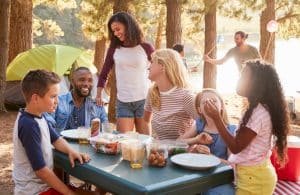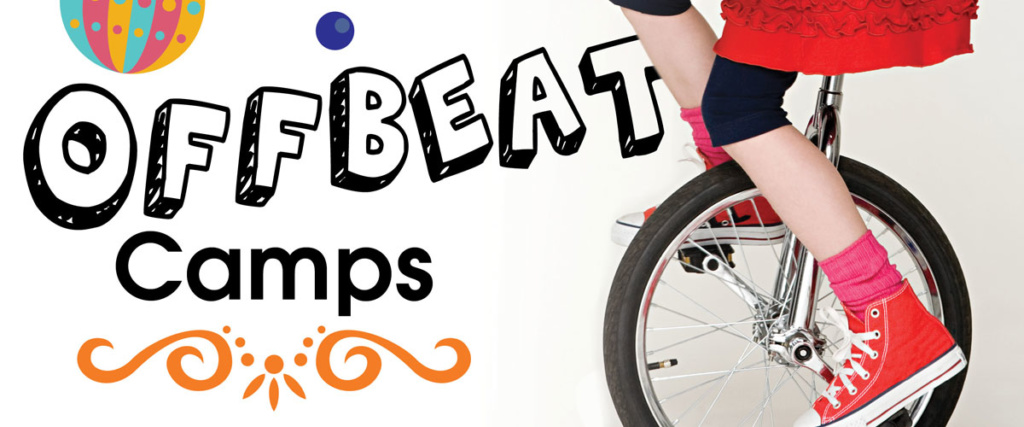Hear the word “camp,” and you might think of kids roasting marshmallows over a campfire or spending a week practicing goal kicks at a local college. But beyond the familiar programs, Central New York boasts a variety of unusual camps.
The focus of such day camps ranges from performing in a rock band, to learning how to cope with the loss of a loved one, to spending time with animals at a zoo, to putting on a circus production.
Rock Musicians
The Redhouse Arts Center in Syracuse offers Rock Camp for kids from ages 12 to 18 during the February and summer recesses. The first camp took place six years ago. Now, Redhouse also offers a Little Rockers program for kids from age 6 to 12 (summer session only), and a Touring Rock Band camp for more advanced musicians. In these camps, the kids learn how to write songs and gain at least a basic knowledge of vocals, guitar, drums or keyboard. They also learn how to promote their band. On the last day, they play a gig, says Marguerite Mitchell, camp director.
“Kids are inherently creative,” she says, “and it’s amazing what they can put together.”
Regardless of the participant’s experience with music, cover tunes are not allowed. All work must be original.
“You’re not going to play ‘Smoke on the Water,’ says Mitchell, referring to the early 1970s Deep Purple classic known for its simple but catchy guitar riff.
The principles of Rock Camp apply to Little Rockers, but the younger kids are all part of a single band, instead of forming numerous rock groups, and the counselors provide more assistance. Since the camp’s inception, several previous campers have gone on to study music in college, and some even started their own performing or recording rock bands.
Sera, a 14-year-old in the West Genesee School District, had experience singing, and playing piano and cello before she enrolled in the Touring Rock Band program last year, says her mother, Dawn Bullis. Sera loved the freedom to write lyrics and music. Bullis was especially impressed with the way the campers immediately began experimenting with the instruments before organizing into bands and incorporating each other’s ideas into musical arrangements and performances.
“Sera brought songs she already wrote,” Bullis says. “The other kids really wanted to create music for those songs. It was cool to see it come together.”
Adds Sera: “I love music at school, but this was a really, really fun change.”
No matter the age of campers, Mitchell says, the real magic moment comes when they get their promotional photos taken.
“That’s when they feel like rock stars,” she says.
A Safe Space
Moments of transcendence can occur at Camp Healing Hearts when kids who have lost someone get a chance to express themselves freely. The day camp is presented by Hospice of Central New York and takes place for a week in August at the YMCA Camp Iroquois in Manlius. It’s open to children in grades 1 through 6 who have lost a relative or friend. The program has been going strong for more than a decade, says Karen Leshko-Balamut, the camp’s director and a licensed clinical social worker.
The activities are that of a typical summer day camp: swimming, archery, hiking, horseback riding, arts and crafts. Yet Camp Healing Hearts includes an emotional and therapeutic component, Leshko-Balamut says. “All the activities are designed to allow kids that safe space to talk about their special person.”
For camper Demosthenes, 9, that special person was his brother, Elias Mantalios, who died at age 21. Before going to the camp and meeting others the same age who lost loved ones, Demosthenes often felt alone and had trouble connecting with his parents’ grief and his own, says the boy’s father, Nick Mantalios.
“There’s that combination of therapy and distractions (from the grief), but they are also dealing with the reality,” Mantalios says. “The activities are kind of like a buffer that helps them to manage that.”
Demosthenes wrote about his Healing Hearts experience in an essay, which his parents, Mantalios and Theone Kalkinis, shared.
He described a healing circle and hearing a story about a boy’s feelings of sadness and anger after his mother dies unexpectedly. Demosthenes also wrote about typical camp activities like swimming, hiking and canoeing.
“The counselors made sure to keep us busy and help us get through our grief with a combination of distraction through the activities and discussions about our loss to help us cope,” he wrote. “I really had a good time at the camp and I feel that it helped me cope with my grief. I’m definitely going back next year again.”
On the last day of camp, participants place the memory stone they make in honor of their special person near the fire pit before taking a turn with the microphone to talk about their loved one. Last year, there was an 11-year-old camper who spoke very little the first three days of the camp and didn’t seem to want to open up, Leshko-Balamut says. But on the last day she grabbed the microphone “and pretty much laid everything out.”
“You got to see what a difference four days could make,” she says. “It was amazing.”
Zoo Culture
The Rosamond Gifford Zoo at Burnet Park in Syracuse offers a variety of one-week day camps during the school winter, spring and summer breaks for children from ages 3 to 14. All of the camps, says Nathan Keefe, director of education, “give the kids a chance to become immersed in the zoo culture.”
Campers get a behind-the-scenes look at the facilities and operations, including stops in the tiger building, the elephant barn and the kitchen. There are also talks with the zookeepers. As part of the “animal enrichment” project, the campers make a papier-mache toy with meat inside it for the tigers and a treat cone, with peanut butter, seeds, cereal and nuts, for the primates. The camp includes a daily craft and a variety of games, including some that involve running so kids stay active, Keefe says.
At the Zookeeper Boot Camp, which is for kids ages 12 to 14, campers get hands-on experience caring for domesticated animals, including donkeys, goats and alpacas. This also involves learning about the animals’ diets and working in the garden.
“You get to share the same space with them,” Keefe says.
That “wow” moment at the zoo camps, Keefe says, is often during the art unit when a zookeeper brings out a bearded dragon that walks on a canvas covered with fresh paint and creates his own art.
Lola, an 8-year-old from Syracuse, cherishes her own bearded dragon artwork, says her mother, Jennifer Morin-Boynton. Lola has participated in three zoo camps so far, the most recent one this past February break, and she can’t wait for the next one. Lola has taken a liking to reptiles since her first zoo camp two years ago, her mother says, and even finds some of them “cuddly.” Even more impressive is Lola’s concern for the environment.
“She learned there that protecting the environment is important to the animals,” Morin-Boynton says. “She feels like she’s part of it. Separating the recyclables is not a chore for her. It’s not an order coming from me: She wants to do it!”
A variety of themed zoo camps are planned for this summer, Keefe says, including programs for art, costume making and acting, and field trips that will head to outdoor education areas like Labrador Hollow and Chittenango Falls.
Circus Skills
Open Hand Theater in Syracuse has held Circus Camps for the past 26 years. The camps are open to children ages 8 to 14. All camps are two weeks long and take place in July or August. Participants get lessons in juggling, comedy and dance before putting those skills to work leading up to their circus performance, which also features giant puppets.
Many campers return for consecutive years, and program alumni, including college students, return as volunteer counselors, says Andrea Wandersee, managing director.
“A lot of kids have heard about this through word of mouth: Their friends recommended it,” Wandersee says. “And then they stick with it for years.”
About two-thirds of the students who performed in the Nottingham High School musical last year were past Circus Camp participants, Wandersee says.
Other than the smiling faces and cheering parents, Wandersee says, the best part of the camp is watching the kids develop skills that they can carry over into other activities.
“The problem solving and teamwork is quite impressive,” she says. “They understand that they are creating something bigger than themselves.”





